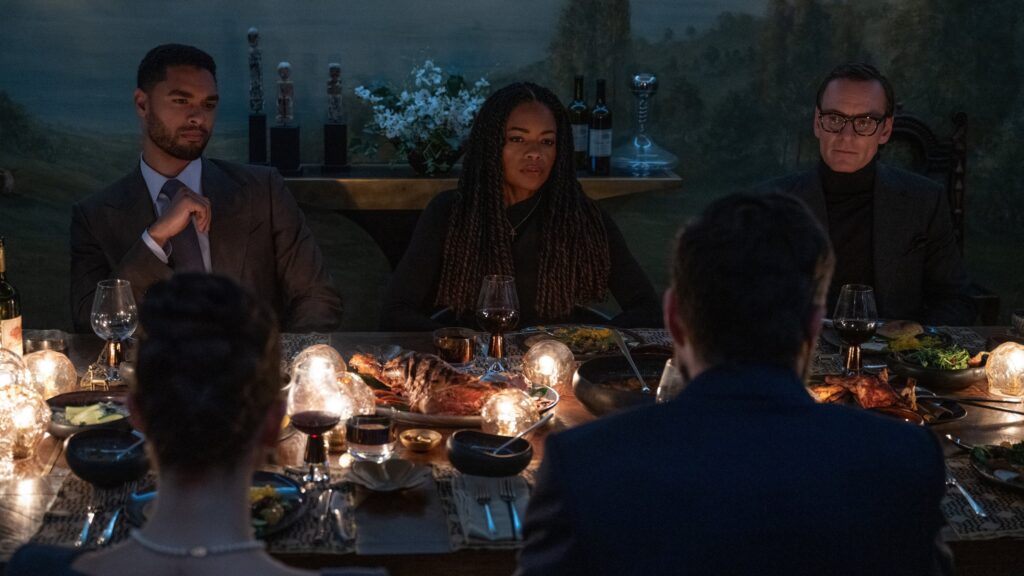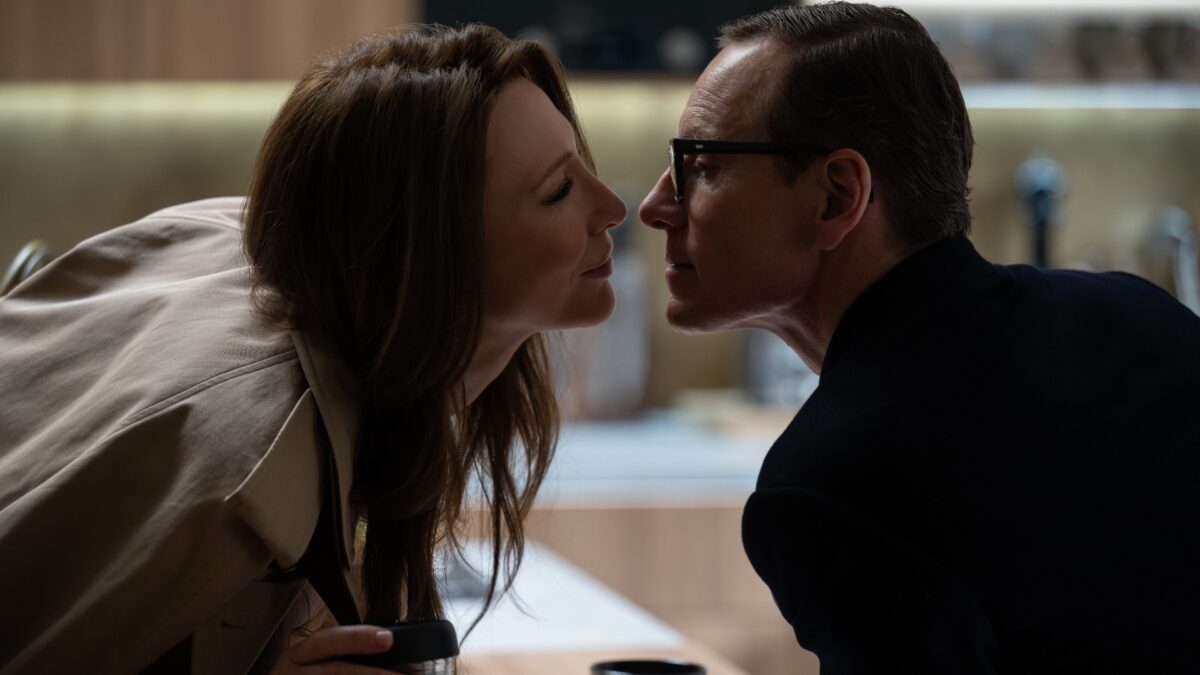Tinker tailor philanderer spy
Steven Soderbergh had himself a proper double feature this spring: Presence and Black Bag, released across the US within weeks of each other, each wildly different in tone, genre, and suit budgets. It’s natural and unavoidable to compare the two, even if the actual connective thread isn’t that tight. And I have to be honest, while Black Bag is strictly speaking a better film, the comparison actually flatters Presence, which is messier and riskier and weirder. That one has its lurches and ugliness, but it leans into a style and specific kind of story, and it never stops pushing those ideas forward. Black Bag, by contrast, is a much smoother watch — clever, eminently pleasant, and a bit clipped. I enjoyed it more in the moment. But for all its teased sexy spy action, it has about as much danger and eroticism as a Lexus.
The setup is great, though. A tight circle of MI6 officers have sprung a leak, passing information on a bit of cyberwarfare software — “Severus,” which might as well be labeled WORLD_WAR_3.EXE — to the Russians. We learn of this through the eyes of senior officer George Woodhouse (Michael Fassbender), who is tasked with figuring out which of his close colleagues is the mole. Complicating things: this crew is not exactly a fortress of personal boundaries. They sleep with each other, cheat on each other, gaslight and manipulate and passive-aggressively flirt their way through briefings and psych evals. There’s Clarissa (Marisa Abela), the satellite analyst, who is antsy about dating cheaters; her boyfriend Freddie (Tom Burke), an agent who happens to struggle with monogamy; Zoe (Naomie Harris), the agency shrink whose couch doubles as a motel bed; and James (Regé-Jean Page), the goody two-shoes rapidly rising through the ranks.

There’s one more suspect, too, the biggie: George’s wife Kathryn (Cate Blanchett), who’s also an agent. As far as George believes, he and his wife are the only monogamous pairing in the group and also the ships least likely to leak their secrets. Of course, their profession requires they keep operational secrets from each other — they call it the “black bag.” But the trust is there. On paper, they seem genuinely wonderful together. It’s exactly the too-good-to-be-true relationship that should detonate by the film’s midway point.
All of that’s makes for a great pressure cooker for an erotic spy thriller. The ingredients are in place for Black Bag to go full Basic Instinct-meets-Tinker Tailor, to lean into the pervy paranoia and let these character tensions combust: Double agent intrigue and a cast of characters whose libidos match their clearance levels, their cat-and-mouse surveillance and evasion a fun seduction game.
And for a while, it seems like that’s what we’re getting. The opening act finds George inviting the gallery over for a dinner party, where he drugs them just enough to loosen lips in order to see whose secrets might run deeper than the rest. This initiates what is essentially a parlor game where their characters and their dynamics are laid out for us. It’s an extra charged take on an Agatha Christie chamber mystery.

Unfortunately, that dinner party is the film’s high point. Black Bag doesn’t fall apart so much as quietly flatten out, missing the nastiest and juiciest possibilities of its premise. There are some fun espionage beats along the way — e.g. George manipulating Clarissa to trace Kathryn to Zurich; and, later, a polygraph montage. But every time the movie inches toward genuine volatility — some irreversible boundary crossed or scenario-altering hookup — it taps the brake and pivots back to chamber mystery mode. Black Bag operates as a psychological thriller about marriage under stress, only there’s not much psychology or marital stress. It’s almost defiantly, recklessly frictionless.
By the time the mystery resolves, the sense of heart-racing spy-sweat intrigue has faded. It’s cozy, which is fine, but disappointing. We get a big climactic revelation that leans on more locked-room parlor intuition by George than any real interpersonal carnage, like he’s another Hercule Poirot. In that sense, the Christie comparisons are not just earned but a little damning. A couple people are killed, a couple people arrested, and everyone goes back to work.
Still, it’s immaculately made. Soderbergh — shooting with cinematographer nom de plume Peter Andrews — crafts a unique and flavorful look that blends underlit domestic spaces and office buildings with blown out practical lights, giving everything a hazy halo that evokes blurry unreality, as if these people are caught in surveillance state purgatory. It’s moody and effective, though maybe too much: the constant bloom and strange lighting wears thin: beautiful like mahogany and Rolex, but tiring.

Performance-wise, no one’s phoning it in, nor will anyone make my year-end lists. Fassbender is quiet competence personified with just a few tiny cracks (that, again, never threaten to shatter), but the role as written gives him too little to do. Blanchett, meanwhile, feels weirdly ill-fit for the role until you realize that’s probably the point. Her character Kathryn teases as a femme fatale or a sphinx — but, without giving it all away, I was more surprised how often her motivation was straightforward. It’s a subversion of Blanchett’s usual mystique and deception, but the kind of subversion that makes a movie less interesting, not more. Among the supporting cast, everyone is fine, but Tom Burke is clearly having the most fun in the film’s silliest role, sleazing it up and hinting toward a movie that’s more fun because more of the characters are pricks like him.
So, yes: Black Bag is good. It’s slick and stylish. It’s competent in all the ways you expect a mid-budget Soderbergh thriller with that poster to be. But it’s ultimately more interested in being a little spycraft mystery than creating or investigating the emotional wreckage it leaves behind, which is quite contrary to what it states it’s going to be at the start. I’d probably rewatch it over Presence since it goes down so smooth. But I can’t help wishing it had gone down dirtier.
Is It Good?
Good (5/8)
Dan is the founder and head critic of The Goods. Follow Dan on Letterboxd. Join the Discord for updates and discussion.


2 replies on “Black Bag (2025)”
Agreed on pretty much all points: this is one that I saw back when it was in theaters, liked it pretty alright, and could not scrape enough interest in thinking about it to go beyond a Letterboxd review. It’s very curiously anticlimactic, and anticlimactic for like twenty minutes straight.
I’m a little surprised the fawning love it’s been getting (96% on RT!, though to be fair my review is positive), but it’s a pleasant sit, at least. I don’t think I would have bothered rewatching and writing about it if I wasn’t trying to keep the daily review posting streak alive 😅